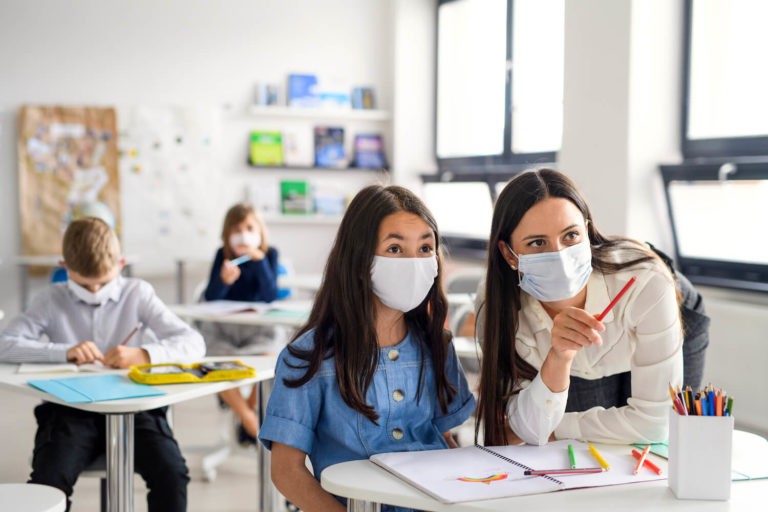Effective Communication Skills
One set of skills all teachers should foster is effective communication skills. As we know, communication involves both listening and speaking, as well as reading and writing. Teachers should really be skilled in all these areas for effective communication. If teachers are effectively communicating, they can make things easier and more understandable for students. Since teachers communicate orally in the classroom daily, they need to make sure their messages are clear to students.
Communication is necessary and holds high importance in delivery of instruction, classroom management, and more. Keeping in mind that all learners take in information differently, teachers need to implement different communication skills which motivate and engage students in their learning process.
Collaboration with Co-Workers
Effective teacher collaboration is essential for stronger practice and higher student achievement. Teachers can work in teams, co-teach, share responsibilities, provide feedback collectively, and build a better sense of trust among their learners through collaboration.
Professional Learning Communities (PLCs) are a wonderful and prevalent way to give teachers opportunities to communicate, review items, and collaborate as a team. These are meetings among the whole team that are usually on a weekly basis to discuss concerns, student achievement, data pieces, updates, and more. Administrators will, at times, pop into these meetings to check in on staff to ensure everything is on the right track. This is also an opportunity to ask questions if there are any at that time.
Creative Thinking
The first way to foster creativity is to model it for students. This can be done through discussions and demonstrations, as well as project-based learning. Through doing so, teachers can also encourage multiple viewpoints and highlight diversity. If there are students from different backgrounds, this should be brought to light and embraced among discussions.
Additionally, teachers can foster creative thinking by helping students see their own ability levels, having them form questions about assumptions and beliefs, encourage problem solving, and continue to read frequently. Reading can touch the imagination and assist in development.
Ability to Adapt
Adaptability in the classroom is one of the most important qualities that every teacher must possess. This also goes along with flexibility. These two characteristics also go together. Last minute changes may also be needed based on certain situations in the classroom. This may be harder for some teachers than for others. In general, this idea is simply being able to acclimate yourself to changing roles, job responsibilities, materials, and schedules. That is always the goal!
Effective Organization Skills
Teachers always need to be organized. Organizational skills relate to planning, lesson design, time management, classroom management, and more. As far as the planning stage, teachers need to be organized in a sense that they need to know how to time planning, what and how to plan, and execute it. For lesson design, teachers need to know what lessons they are planning and ensure they are on with pacing appropriately.
With time management, this pertains to pacing instruction, but also time management in the day-to-day functioning of the classroom. Additionally, classroom management organization comes into play regarding classroom transitions, procedures, and seating arrangements. Teachers should maintain an organized working area as well.
Devotion and Strong Work Ethic
Teachers need to show their devotion and strong work ethic through their work. They need to invest not only in their students just for their career, but in their students as individuals. Teachers need to stay motivated, focused, and on top of work tasks. Teachers should make themselves available to meet with students if they need extra support. Teachers also need to establish solid, trusting relationships with their students from the very start of the school year. This can be built upon and strengthened all throughout the school year.
Knowledge in the Field
Teachers need to be knowledgeable in the field of education. This includes staying up to date on research, attending meetings and professional development, and immersing themselves in their knowledge with their teaching practice. Teachers need to stay current in the world of education research on various topics as well as partaking action in professional development to further their education and experience among colleagues.
As far as the different types of knowledges, they all work hand in hand to benefit the teacher. These types of knowledge include content knowledge, pedagogical content knowledge, and curricular knowledge. Content knowledge generally refers to the concepts and topics taught and learned in specific courses, rather than skills such as reading, writing, math, etc., that students learn. Pedagogical knowledge refers to specialized knowledge teachers use to create effective learning environments for all students for their ultimate success. Curricular knowledge refers to a teacher’s understanding of the school’s learning programs that have been developed for different levels.
In summary, these are some of the various skills that all teachers should foster. Teachers are always striving for improvement in their career and to make their classrooms the best environments possible. Teaching is a profession that requires so many different “hats” for one person.




